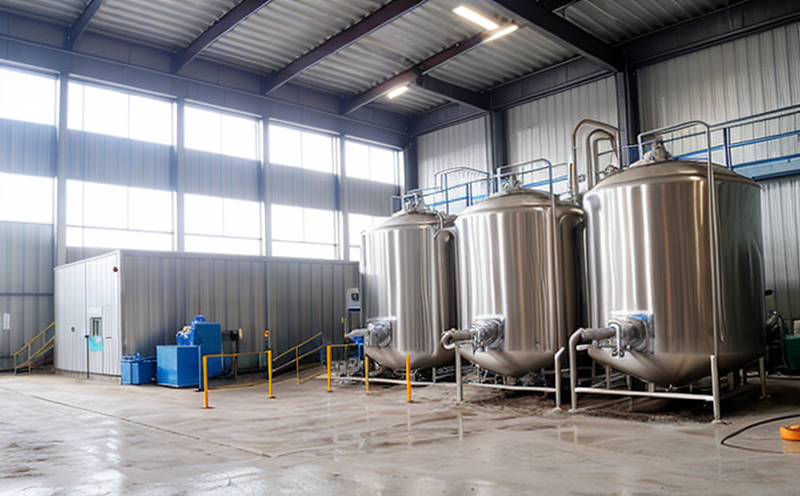ASTM D6975 Biofilm Formation Test in Industrial Water
The ASTM D6975 standard provides a method to determine the biofilm formation potential of industrial water, which is crucial for assessing the risk of microbial contamination and corrosion within water systems. This test is particularly important for industries such as manufacturing, power generation, and chemical processing where water quality directly impacts operational efficiency and product quality.
Industrial process waters often serve multiple functions beyond mere cooling or cleaning. They can also transport chemicals, nutrients, and other substances that promote the growth of microorganisms. Biofilm formation in these systems can lead to a range of issues including reduced heat transfer efficiency, fouling of equipment, and increased chemical usage. Therefore, understanding and managing biofilm formation is critical for maintaining optimal water quality.
The ASTM D6975 test involves exposing a standardized surface material (typically glass or stainless steel) in contact with the industrial water sample under controlled conditions to observe and quantify biofilm development over time. The primary objective is to evaluate how quickly biofilm forms and its potential impact on the integrity of the water system.
For accurate results, it's essential to follow strict procedural guidelines outlined in the ASTM D6975 standard. These include precise temperature control, pH monitoring, and a defined incubation period. The test duration can vary depending on the specific application but is generally conducted over several days or weeks. This allows for comprehensive observation of biofilm formation under real-world conditions.
The results from this test provide invaluable insights into the water quality and system performance. By identifying early signs of biofilm formation, plant operators can implement preventive measures to mitigate risks such as increased cleaning costs, equipment failures, and potential health hazards. This proactive approach not only enhances operational efficiency but also ensures compliance with regulatory standards.
Furthermore, ASTM D6975-compliant testing supports decision-making processes related to water treatment strategies, system design improvements, and the selection of appropriate materials for use in industrial environments. It serves as a benchmark against which ongoing monitoring can be compared, ensuring continuous improvement in water quality management practices.
Scope and Methodology
The ASTM D6975 standard specifies procedures for evaluating biofilm formation potential in industrial process waters using standardized testing methods. The scope encompasses various aspects including preparation of the test specimen, exposure conditions, monitoring protocols, and analysis techniques.
- Preparation: A suitable surface material is prepared according to ASTM guidelines. This typically involves cleaning and conditioning the surface to eliminate any pre-existing biofilm or contaminants.
- Exposure: The prepared surface is placed in contact with the industrial water sample under controlled environmental conditions, including temperature regulation within a specified range.
- Monitoring: Regular observations are made during the incubation period to record changes in biofilm characteristics. This includes measurement of biomass accumulation and morphological changes.
- Analysis: After completing the exposure period, samples are analyzed using appropriate microbiological techniques to quantify biofilm biomass and characterize its composition.
The ASTM D6975 test is designed to be adaptable for different types of industrial water systems. It can be tailored based on specific industry requirements or regulatory expectations. By adhering strictly to the standardized procedures, laboratories ensure consistent and reliable results across diverse applications.
Quality and Reliability Assurance
Ensuring accurate and repeatable results is paramount in ASTM D6975 biofilm formation testing. Quality assurance (QA) measures include regular calibration of instruments used for temperature control, pH measurement, and biomass quantification. Personnel involved in the testing process undergo rigorous training to maintain proficiency with both procedural steps and interpretation of outcomes.
Reproducibility is achieved through adherence to strict protocols throughout the entire testing cycle. This includes consistent preparation of test specimens, uniform exposure conditions, and standardized analytical methods for biofilm assessment. Inter-laboratory comparisons are conducted periodically to verify consistency among different facilities performing ASTM D6975 tests.
Compliance with international standards like ISO 17025 ensures that the laboratory maintains high-quality standards in its testing services. This certification guarantees that all aspects of the service, from sample reception through final reporting, meet stringent requirements for accuracy and precision.
To further enhance reliability, advanced analytical tools such as scanning electron microscopy (SEM) and Fourier transform infrared spectroscopy (FTIR) are employed to provide detailed insights into biofilm structure and composition. These techniques offer precise measurements that complement traditional microbiological approaches, providing a comprehensive understanding of biofilm characteristics.
Competitive Advantage and Market Impact
The ASTM D6975 test offers significant competitive advantages by enabling early detection of potential issues related to biofilm formation. This allows companies to take proactive measures, thereby reducing downtime and operational costs associated with equipment fouling or failures.
- Proactive Management: By identifying biofilm formation trends early on, businesses can implement targeted interventions before they escalate into critical problems.
- Cost Efficiency: Preventive strategies based on ASTM D6975 data lead to reduced maintenance needs and lower overall expenditure on water treatment chemicals.
- Enhanced Reputation: Demonstrating commitment to high-quality industrial water management through compliance with established standards enhances a company's reputation among clients and stakeholders.
In terms of market impact, ASTM D6975 testing is increasingly recognized as a benchmark for best practices in industrial water quality management. Adoption by leading companies signals their dedication to sustainability and operational excellence, influencing industry trends towards more rigorous water quality controls.





